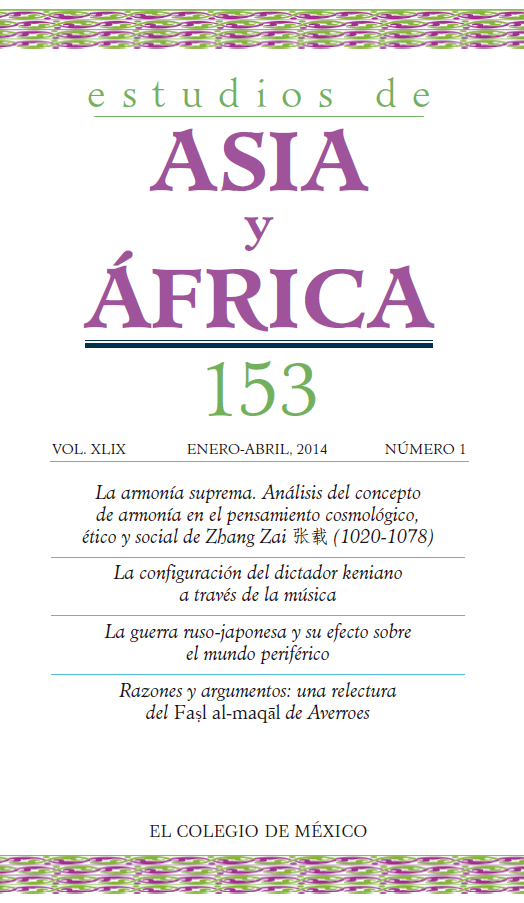Resumen
Un tema controvertido en el pensamiento de Averroes es la relación entre filosofía y religión. Averroes se ocupa de ella de manera sumamente original en el Faṣl al-maqāl. En este artículo propondré una ruta de interpretación ligeramente distinta de la que otros intérpretes de este tratado han aportado. Sostendré que puede ser leído como un tratado de argumentación donde Averroes se ocupa no únicamente de mostrar la armonía entre la ley religiosa y la filosofía, sino también de esbozar una teoría de la argumentación sumamente flexible que le sirve para definir el estatuto epistémico de las creencias religiosas.
Referencias
Al-Ghazālī, “The Correct Balance”: Freedom and Fulfillment (An Annotated Translation of Al-Ghazali’s al-Munqidh min al-Dalal including Five Key Texts) , tr. R. J. McCarthy, Boston, Twayne Publishers, 1980.
Averroes, Averroè: Il trattato decisivo, sull’accordo della religione con la filosofia, tr. Massimo Campanini, Milán, Biblioteca Universale Rizzoli, 1994.
Averroes, Averroes Discours décisif, ed. y tr. Marc Geoffroy, París, Flammarion, 1996.
Averroes, Averroes: On the Harmony of Religion and Philosophy, tr. George F. Hourani, Londres, Luzac & Co., 1976.
Averroes, “Doctrina decisiva (Fasl al Maqál) y fundamento de la concordia entre la ley religiosa (la revelación) y la sabiduría (la filosofía general) de Ibn Roshd (Averroes)”, en Carmen Rovira (comp.), Selección de Lecturas: Historia de la Filosofía II, Edad Media y Renacimiento, tr. Vera Yamuni Tabuch, México, Universidad Nacional Autónoma de México, 1996, pp. 43-50.
Averroes, “Fasl al-maqāl”, en Sobre filosofía y religión, introducción y selección de textos de Rafael Ramón Guerrero, Pamplona, Universidad de Navarra, 1998.
Averroes, “Fasl al-maqāl o Doctrina decisiva y fundamento de la concordia entre la revelación y la ciencia”, tr. Manuel Alonso, en Teología de Averroes: estudios y documentos, Madrid-Granada, Consejo Superior de Investigaciones Científicas, 1947, pp. 149-200.
Averroes, Ibn Rushd, Maßgebliche Abhandlung. Fasl al-maqāl, tr. Frank Griffel, Berlín, Verlag der Weltreligionen, 2010.
Averroes, Tahāfut al-Tahāfut (The Incoherence of the Incoherence) , 2 vols., tr. Simon van den Bergh, Londres, Luzac & Co., 1969.
Averroes, The Attitude of Islam Towards Science and Philosophy: A Translation of Ibn Rushd’s Famous Treatise Faslul-al-Maqali, tr. Hamid Naseem y Aadil Amin, Nueva Delhi, Sarup & Sons, 2003.
Averroes, The Book of the Decisive Treatise Determining the Connection Between the Law and Wisdom & Epistle Dedicatory, tr., introd. y notas Charles Butterworth, Provo, Utah, Brigham Young University Press, 2001.
Campanini, Massimo, Averroè, Bolonia, il Mulino, 2007.
Crawford, Stuart F. (ed.), Averrois Corduvensis Commentarium Magnum in Aristotelis De Anima libros, Cambridge, The Medieval Academy of America, 1953.
Coccia, Emanuele, Filosofía de la imaginación, tr. M. T. D’Meza, Buenos Aires, Adriana Hidalgo editora, 2007.
Davidson, Herbert, Alfarabi, Avicenna and Averroes on Intellect, Oxford, Oxford University Press, 1992.
Hyman, Arthur, “Aristotle’s Theory of the Intellect and its Interpretation by Averroes”, en Dominic J. O’Meara (ed.), Studies in Aristotle, Washington, The Catholic University of America Press, 1981, pp. 161-191.
Kogan, Barry S., Averroes and the Metaphysics of Causation, Nueva York, State University of New York Press, 1985, pp. 17-25.
Leaman, Oliver, Averroes and his Philosophy, Oxford, Clarendon Press, 1988.
Mahdi, Muhsin, “Remarks on Averroes Decisive Treatise”, en Michael E. Marmura (ed.), Islamic Theology and Philosophy. Studies in Honor of George F. Hourani, Albany, Suny Press, 1994.
Mohammed, Ovey N., Averroes’ Doctrine of Immortality: A Matter of Controversy, Waterloo, Ontario, Wilfrid Laurier University Press, 1984.
Renan, Ernest, Averroès et l’averroïsme, París, Maisonneuve et Larose, 1997.
Shehaby, Nabil, “‘Illa and Qiyās in Early Islamic Legal Theory”, Journal of the American Oriental Society, vol. 102, núm. 1, 1982, pp. 27-46.
Taylor, Richard C., “Averroes: God and the Noble Lie”, en R. E. Houser (ed.), Laudemus viros gloriosos. Essays in Honor of Armand Maurer, CSB, Notre Dame, University of Notre Dame Press, 2007, pp. 38-59.
Taylor, Richard C., Averroes’ Long Commentary on the De Anima of Aristotle, New Haven-Londres, Yale University Press, 2009.
Taylor, Richard C., “Averroes on Psychology and the Principles of Metaphysics”, Journal of the History of Philosophy, núm. 36, 1998, pp. 507-523.
Taylor, Richard C., “Ibn Rushd/Averroes and ‘Islamic’ Rationalism”, Medieval Encounters, vol. 15, núm. 2-4, 2009, pp. 225-235.
Taylor, Richard C., “Improving on Nature’s Exemplar: Averroes’ Completion on Aristotle’s Psychology of Intellect”, en Peter Adamson, Han Baltussen y M. W. F. Stone (eds.), Philosophy, Science and Exegesis in Greek, Arabic and Latin Commentaries, 2 vols. (suplemento del Bulletin of the Institute of Classical Studies, núm. 83), Londres, University of London, 2004, vol. 2, pp. 107-130.
Taylor, Richard C., “Personal Immortality in Averroes’ Mature Philosophical Psychology”, Documenti e Studi sulla Tradizione Filosofica Medievale, núm. 9, 1998, pp. 87-110.
Taylor, Richard C., “‘Truth does not Contradict Truth’: Averroes and the Unity of Truth”, Topoi, vol. 19, núm. 1, 2000, pp. 3-16.
Wohlman, Avital, al-Ghazali, Averroës and the Interpretation of the Qur’an, tr. David Burrell, Oxon, Routledge, 2010.
Esta obra está bajo una licencia internacional Creative Commons Atribución-NoComercial-SinDerivadas 4.0.
Derechos de autor 2022 Estudios de Asia y África



